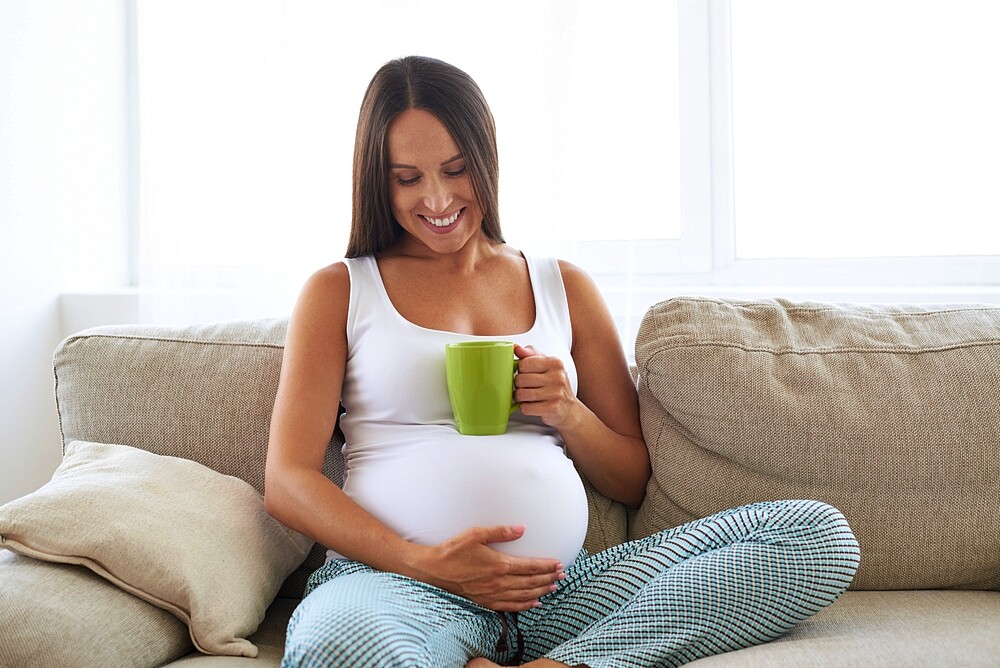A pleasantly warm tea during pregnancy can relax. But beware: not every type of tea is allowed! Here you will find out everything you need to know.
Tea during pregnancy is not only a good way to cover your increased fluid requirements, it can also help to alleviate one or two pregnancy complaints. But not every type of tea is safe. Here you can find out everything you need to know.
Tea in pregnancy: General tips
- Alternate the tea varieties and do not drink several cups of one variety for days. In this way, you bring variety to your diet and avoid the risk of unwanted side effects.
- Avoid sugar and sweetener in the tea.
- In winter, the tea warms you from the inside. In summer you can put it in the fridge, so it is a welcome refreshment at high temperatures.
Tea in pregnancy: These teas are harmless
- Fennel: Fennel has a calming effect on the digestive tract. If you suffer from stomach cramps and flatulence, a cup of fennel tea can work wonders.
- Fruits: Fruit teas are absolutely harmless during pregnancy. They are not only delicious, but also rich in minerals and vitamin C.
- Rosehip: Rosehip tea is the tea of choice for constipation. It is digestive and slightly laxative. It also strengthens the immune system.
- Camomile: Camomile tea is a true all-rounder. On the one hand, its calming effect promotes a calm and restful sleep. On the other hand, it is beneficial for the stomach and intestines, helps with cramps, can relieve heartburn and aids digestion.
- Lavender: Lavender tea has a calming and sleep-inducing effect. It is also said to have antispasmodic and antibacterial properties.
- Melissa: Melissa tea can be drunk for gastrointestinal problems, it has an antispasmodic and calming effect.
- Rooibos: Rooibos tea combines all kinds of positive properties. It contains many minerals, antioxidants and iron. The plant substance rutin strengthens the vessel walls and thus also prevents varicose veins. Rooibos has also been known for centuries for its calming effect on the gastrointestinal tract. But that is not all: it is also a natural mood enhancer. Rooibos tea dampens the effect of the stress hormone cortisol and has a positive influence on the happiness hormone serotin.
Tea in pregnancy: These teas should be consumed with caution
- Raspberry leaf and blackberry leaf tea: Probably the best known pregnancy tea is raspberry leaf tea. Many midwives swear by the tea because it loosens the tissues and muscles around the pelvis, strengthens the uterus and stimulates the uterine muscles. However, because raspberry leaf tea stimulates contractions, it may only be drunk after the 37th week of pregnancy. Three to five cups a day are recommended. From 39th week of pregnancy, the daily dose can be increased to four cups. Please do not try the experiment with raspberry leaf tea on your own, but consult your midwife or gynaecologist. The same applies to blackberry leaf tea.
- Peppermint: Peppermint tea can be helpful for nausea, vomiting and stomach problems. But don’t drink too much of the peppermint – larger amounts can cause uterine contractions.
- Sage: Sage tea is beneficial for the digestion. As a tea it has an antispasmodic effect and calms the stomach and intestines. Sage tea should only be consumed in moderation during pregnancy as it can have a stimulating effect on the uterus. And beware after birth: sage inhibits milk production during breastfeeding.
- Ginger: During your pregnancy you should not eat more than six grams of ginger a day, as the tuber has a contraction-promoting effect in higher doses. Ginger tea is safe in small doses and can help you with nausea and vomiting.
- Black tea: It is better to avoid too much caffeine during pregnancy. Two to three cups of black tea a day are allowed, if you don’t drink coffee or other caffeinated drinks as well.
- Green tea: Green tea also contains caffeine, so the same applies here: Two to three cups are fine.
- Hibiscus: Although hibiscus tea is good for colds, it lowers blood pressure and relieves cramps, but during pregnancy this tea is only recommended in small quantities. Hibiscus tea stimulates the blood circulation in the uterus and lowers the oestrogen level.
Tea in pregnancy: These teas are taboo
- Verbena: Verbena tea promotes contractions – hands off.
- Ginseng: Studies have shown that ginseng tea in larger quantities can lead to androgynous babies due to an overstimulation of the male hormones, so it is better to avoid the Asian medicinal plant.
- St. John’s wort: St. John’s wort tea is not recommended during pregnancy. It can have a toxic effect on the embryo and cause permanent damage. So stay away from St. John’s wort tea.
- Passion flower: Passion flower tea in high dosage has a stimulating effect on the uterus.
- Rosemary: Rosemary tea can cause cramps and contractions. As a spice when cooked in small quantities, however, the herb is harmless, is even considered to stimulate circulation and increase blood flow, but rosemary tea in larger quantities is taboo.
- Liquorice root: You should remove liquorice root in the form of tea or liquorice from your diet during pregnancy. The root increases placental permeability, thus impairing the development of the brain and hormonal glands in the unborn child and increasing the risk of miscarriage.
- Draining teas: Pregnant women should avoid herbal teas that have a draining effect: Corn beard, birch leaf, parsley, lovage, celery and nettle tea. Your kidneys already have enough to do during pregnancy and you should not burden them with dehydrating herbal teas.

